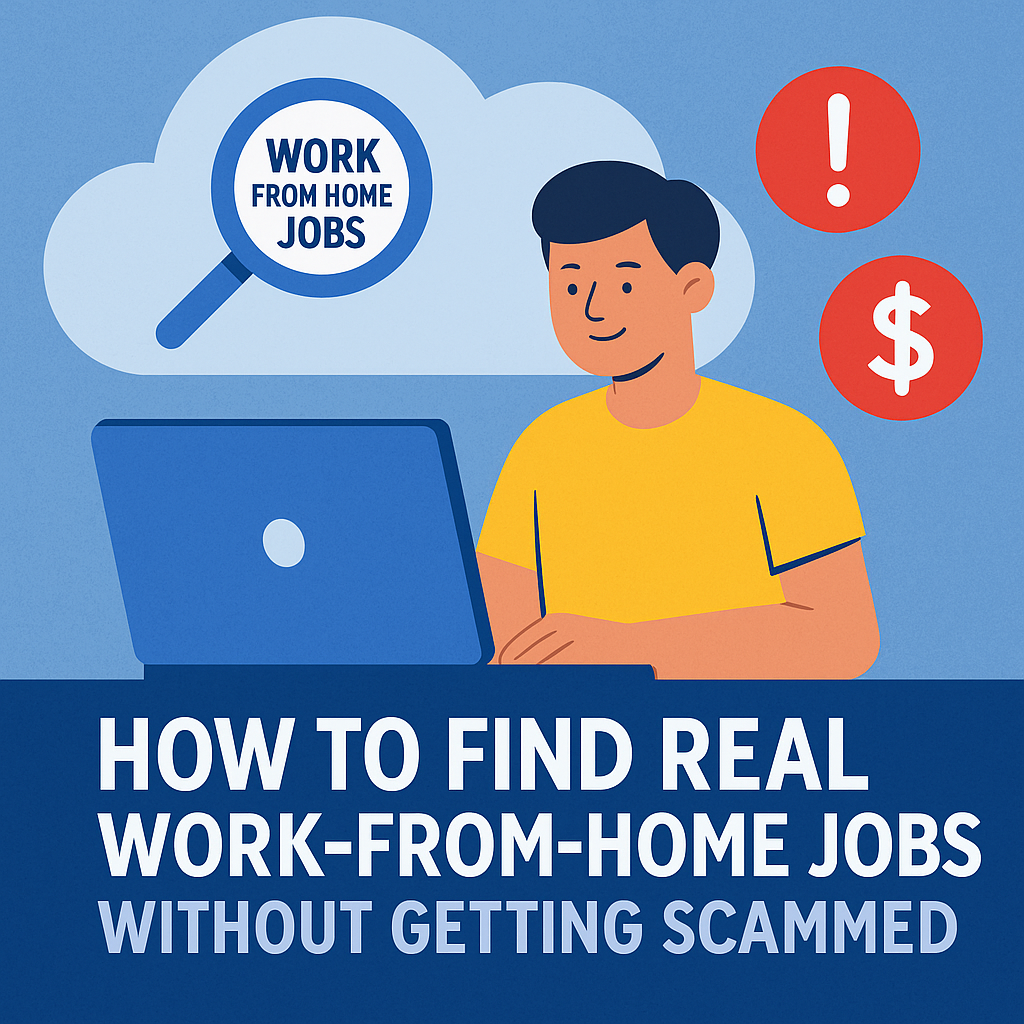How to Find Real Work-from-Home Jobs Without Getting Scammed! 💼🏠
In today’s rapidly evolving digital landscape, remote work is no longer a luxury—it’s a lifestyle and career choice for millions. The flexibility, freedom, and better work-life balance make working from home a dream come true for many. But alongside this booming opportunity comes a harsh truth: online job scams are more rampant than ever.
So how do you find real, trustworthy work-from-home jobs without falling into a trap? This ultimate guide is packed with tips, red flags, and resources to help you stay safe while searching for genuine remote job opportunities. Let’s dive in! 🐟

✨ Why Are Work-From-Home Scams So Common?
Scammers thrive where there’s high demand and vulnerability. With remote work surging in popularity—especially post-pandemic—millions are on the hunt for online jobs. And scammers know it. They exploit this desire by promising quick money, zero qualifications, and a fast hiring process.
They often target people who:
- Are desperate to leave traditional office jobs
- Need urgent income
- Are new to remote work and unaware of common scam patterns
Remember: if it sounds too good to be true, it probably is.
⚡ Common Work-from-Home Scams (And How to Spot Them)
Let’s break down the most prevalent scams in the remote job world and how to identify them:
1. ❌ Fake Job Postings on Legit Platforms
Even reputable sites like LinkedIn or Indeed may occasionally host scam listings. These posts mimic real companies, sometimes even using their logos and HR staff names.
How to avoid it:
- Double-check the company’s official site for a matching listing
- Never apply via random Gmail or Yahoo emails
2. 🚫 Pay-to-Work Schemes
You’re told to pay a “registration fee,” buy a training kit, or pay for software. This is a huge red flag.
How to avoid it:
- Real companies never ask for money upfront
- Avoid listings that promise high pay for minimal work
3. 🧑💻 No Interview or Background Check
Getting hired without any formal interview or assessment? It’s likely a scam.
How to avoid it:
- A real job has a process: application, interview, assessment
- Be cautious if you’re offered a job immediately with little interaction
4. 👤 Personal Info Harvesters
These scammers post fake jobs to steal your identity by collecting your SSN, Aadhaar, bank details, or ID copies.
How to avoid it:
- Never provide personal or financial details until you’ve verified the company
5. 👮 Check Cashing or Money Transfer Jobs
You’re asked to receive money into your account and forward it elsewhere. This is illegal and highly dangerous.
How to avoid it:
- Don’t act as a middleman for anyone—especially when you’re new to the job
✅ How to Find Real Work-from-Home Jobs (Step-by-Step)
Now that you know the risks, let’s focus on how to find genuine remote work:
Step 1: 🔍 Use Legit Job Boards
Stick to trusted job sites that specialize in remote or flexible jobs:
- FlexJobs – 100% screened listings
- We Work Remotely – Popular with tech and startup jobs
- Remote.co – Broad job variety
- LinkedIn & Indeed – Great but double-check listings
These sites vet employers, minimizing scam risk.
Step 2: 🤔 Research Before Applying
Even if a job looks good:
- Google the company name + “scam” or “reviews”
- Check Glassdoor, Reddit, or Trustpilot
- Verify the company’s contact information and LinkedIn page
If you can’t find a digital footprint, it’s probably fake.
Step 3: 📡 Build a Solid Remote Resume
Remote jobs are competitive. Your resume should include:
- Technical skills (Zoom, Slack, project management tools)
- Self-motivation and time management examples
- Previous remote or freelance experience
Pro tip: Include a short cover letter showing you’re self-disciplined and reliable.
Step 4: 👀 Watch for Red Flags During the Hiring Process
If during the interview process you notice:
- Pressure to act fast
- Vague responses
- Requests for money Then back out immediately. A real employer won’t rush or mislead you.
Step 5: 📚 Keep Learning New Skills
Legitimate work-from-home roles often need skills. Free platforms like Coursera, LinkedIn Learning, and Udemy offer courses in:
- Writing & Editing
- Marketing & SEO
- Graphic Design
- Customer Service
- Data Entry & Virtual Assistance
More skills = more real job offers.
🚀 Popular & Trusted Remote Job Roles
Here are real jobs that are usually scam-free (when applied through safe platforms):
1. Virtual Assistant
Offer admin help to business owners: manage emails, schedule calls, and maintain files.
2. Freelance Writer / Editor
Websites and businesses need blog content, social media captions, and newsletters.
3. Graphic Designer
With tools like Canva or Adobe Illustrator, you can land gigs for branding, logos, and online ads.
4. Social Media Manager
If you know how Instagram, LinkedIn, or TikTok works—this one’s for you!
5. Customer Support Agent
Answer calls, emails, and chats for global companies from the comfort of home.
6. Online Tutor
Teach math, English, or coding via Zoom for kids or adult learners.
7. Data Entry Jobs
Legit on sites like Clickworker, Appen, and Microworkers. Simple but honest work.
📱 Tools to Protect Yourself from Scams
Use these tools to check if a company or job is real:
- WHOIS Lookup: Find who owns the domain
- Google Safe Browsing: See if the website is flagged as dangerous
- Better Business Bureau (BBB): Check U.S.-based company ratings
- ScamAdviser: See website trust scores
Also, keep antivirus software updated on all your devices.
💬 Final Thoughts
Work-from-home jobs are real, but so are scammers. Your dream remote role won’t require upfront payments, won’t rush you, and will have a visible online presence.
Be alert. Trust your gut. And always verify before you apply.
If you follow the steps in this guide, you’ll save time, avoid stress, and get closer to building the remote lifestyle you truly deserve.
